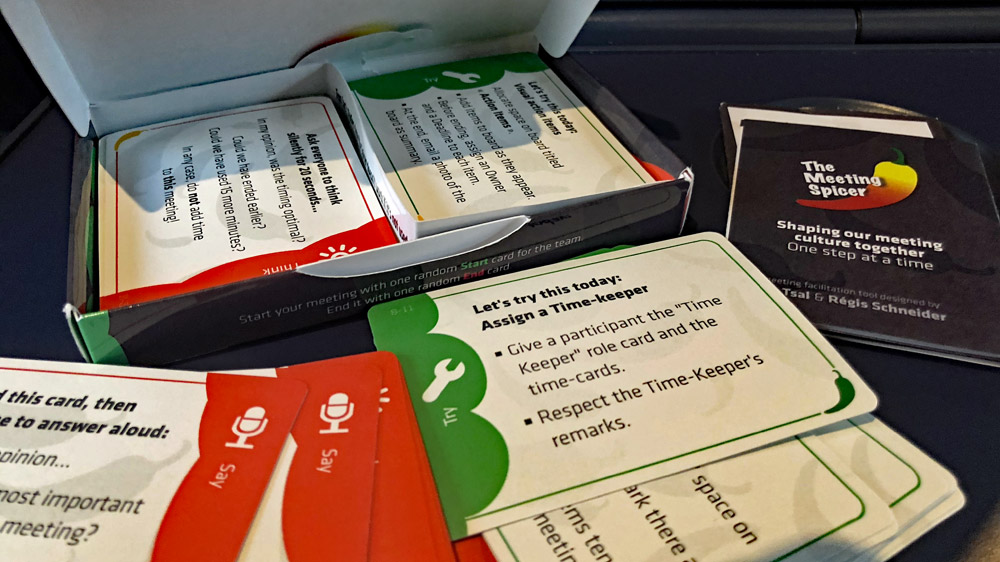Here are some quotes from research about meetings that I came across lately: “Most professionals attend approximately 15 meetings a week.” “…executives [are] spending anywhere from 50 to 90 percent of their time in meetings.” “Around 70 percent of senior managers view meetings as unproductive.” “88% of the participants find meetings useless.” “75% take the opportunity to do something else in meetings.”
Assuming those numbers are true, this is sad and frustrating. In this post you will find some ideas and inspiration on how to start changing what’s happening in your meetings.
I collected the quotes above from the Freakonomics Podcast “How to make meetings less terrible” and “The Meeting Spicer” card deck. The podcast refers to an interview with the organizational psychologist Steven Rogelberg of the University of North Carolina, Charlotte and the “Meeting Spicers” mention a survey by IFOB. I recommend both the podcast and the card deck.
So why do we meet anyway?
In an agile context it’s common to work in teams. We need the know-how and the creativity of each team member to do the next valuable step that tackles the user problem we are currently facing (or to conquer the complexity we are living in, if you like). And we don’t want team members only to be involved. We want them to be affected. So we meet “for a purpose that is sustainably related to the functioning of an organization or group… We need to have problems or crisis and decisions to have meetings.” (Hellen Schwartzman in the podcast mentioned above)
Or the other way around: If you don’t have a problem or crisis or decision to make, you actually don’t need a meeting. Doing that properly would probably delete half of the meetings in your calendar.
Meetings where (highly paid) people are gathering to update each other on a status of this or that are not only a waste of time but also a costly expense for your company. The owner of such a meeting should be aware of that and should think of other creative ways how to have everyone status-updated (if that is necessary at all). Maybe the meeting owner is only holding the meeting to establish his or her (boss) status? In that case it’s no wonder the meeting culture produces the numbers mentioned in the beginning.
(Culture) hack your meeting and spice it up
So, but this is your company and you find it hard to change the meeting culture?
The podcast comes up with a couple of ideas. Here are my favorites:
- Have your agenda (you have one, right?) not in topics but in questions.
Framing the topics as questions gets it clearer who and what needs to be there for the meeting. - Invite for the meeting for as long as it should be (and not for 1h)
Don’t fall for Parkinson’s Law (“Work expands to whatever time is allotted to it.”). Think and then invite maybe for 40 minutes (or 39 minutes?). - Spent the first minutes to connect the people with each other
Ask e.g. “What was your best part of your week so far? What was the worst part?” Over time some interesting topics will come up.

“The Meeting Spicer” card set from Dov Tsal & Régis Schneider uses a playful approach to have your meetings more focused and effective. It is a set of short practices that can be easily introduced to any meeting. The practices are based on micro-learning: So you are spending (only) one minute per meeting on the practice. So the idea to try this for one minute will have minimal resistance.
To get you a better idea:
In a first step introduce the “end cards” to your meeting. That is a set of cards with activities to say, think or try. Let someone from the meeting participants pick one card and then read out loud the activity: e.g. “How do I feel now compared to the start? Did the meeting energize me? Did it drain me?” (Think) or “In your opinion: What is the single most important outcome from this meeting?” (Say)
If that is working well, use also the “start cards” in a second step. It’s also a set of card with activities: e.g. “Ask everyone to think silently for 20 seconds: Is the meetings’s purpose clear to me?” (Think) or “Assign a Time-Keeper: Give a participant the “Time Keeper” role card and the time-cards (provided in the card deck). Respect the time keepers remarks during the meeting.” (Try)
I have heard that the second edition is just out now.
At it-agile I provide a training on meeting facilitation together with a colleague.Next to a huge amount of activity and practice, we always find time to discuss topics like this. You are very welcome to join.